
USE OF COMPUTERS IN BUSINESS MANAGEMENT. Dr. W.K. SARWADE Associate Professor Department of Commerce Dr. Babasaheb Ambedkar Marathwada University Aurangabad 18 June-2011. Basic Concepts.

mea + Follow
Download PresentationAn Image/Link below is provided (as is) to download presentation Download Policy: Content on the Website is provided to you AS IS for your information and personal use and may not be sold / licensed / shared on other websites without getting consent from its author. Content is provided to you AS IS for your information and personal use only. Download presentation by click this link. While downloading, if for some reason you are not able to download a presentation, the publisher may have deleted the file from their server. During download, if you can't get a presentation, the file might be deleted by the publisher.

2. . "Technophobia be gone?""Man versus Machine""Deus ex Machina""Rise of the Machines". 3. Who are we? . New clinical EBP group commenced late 2010.Focus on active member involvement. SPs from public, private, other government agencies, Newcastle University working in a range of clinical set
320 views • 29 slides
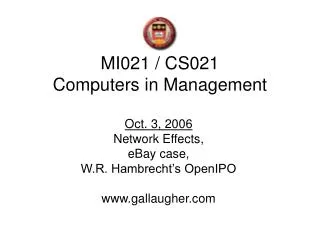
MI021 / CS021 Computers in Management. Oct. 3, 2006 Network Effects, eBay case, W.R. Hambrecht’s OpenIPO www.gallaugher.com. Issues Covered. Network Effects Defined Characteristics of markets & competition when present Examples Auction Models liquidation vs. market efficiency auctions
249 views • 13 slides

"To Catch a Thief" IT Forensics in Financial Investigators Andy Harbison Forensic & Investigation Services Chartered Accountants Leinster Society 25 September 2013. Hotmail. Most crimes use computers…. Did the suspect research the crime? Did the suspect launder the money?
125 views • 0 slides
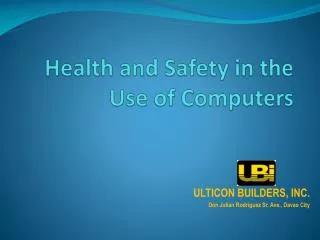
Health and Safety in the Use of Computers. ULTICON BUILDERS, INC. Don Julian Rodriguez Sr. Ave., Davao City. Major Health Effects from Prolonged Use of Computer. Eye/ Visual problems- includes Smarting Itchiness Gritty Feeling Redness Tearing Dryness Sensitivity to light Blurring
3.58k views • 46 slides
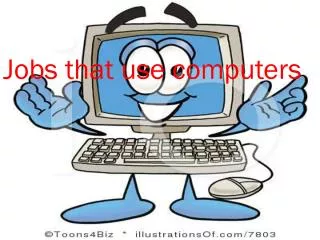
Jobs that use computers. Florist. Florist use computers a lot. My mom is a florist and without the laptop she wouldn’t have her buisness . One of the ways florists use computers is to order there flowers to make bouquets. Another way Is she can send and recive emails from other people.
301 views • 5 slides
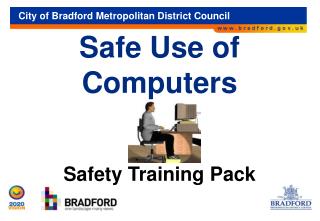
Safe Use of Computers. Safety Training Pack. This page is intentionally blank. Introduction. This training pack is for use by all staff who use computers at work. You need to keep this training pack as it has health and safety information you need for your job.
1.33k views • 39 slides
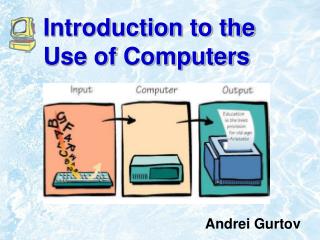
Introduction to the Use of Computers. Andrei Gurtov. Course Outline. Internet Unix Word processing HTML Spreadsheets Presentations Graphics Peripherals TeX. The Course. Registration: http://ilmo.cs.helsinki.fi/english.html Lectures 15.1-5.3 Tuesdays 12-14 A320 Practice sessions
170 views • 6 slides

Environmental Energy Management in Pervasive Computers. Aman Kansal, John Curnutte, Gautam Kachroo. CS 218, Prof Mario Gerla. What are sensor networks?. Networks of numerous deeply embedded devices which sense (and control) the environment Wireless, low energy, low datarate, autonomous.
355 views • 28 slides
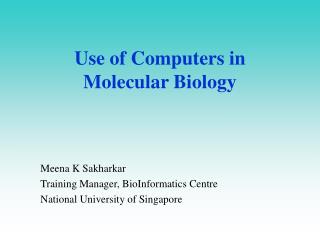
Use of Computers in Molecular Biology. Meena K Sakharkar Training Manager, BioInformatics Centre National University of Singapore. What is BioInformatics?. Many related terms and buzzwords A multiplicity of names: bioinformatics
1.65k views • 67 slides
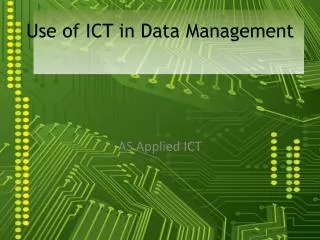
Use of ICT in Data Management. AS Applied ICT. Contents. Database Management System. Functions in a Sequential File. Sequential Files. Hierarchical Database Management System. Processing a record. Index Sequential and Random Access File. Performing Functions.
491 views • 23 slides

Use of Computers . Study vs. Recreation. Presentation version 2. Done by Nishat Naoushin. My (rubaiyat) version was little bit outdated with 0ffice 2003. Meaning Of Topic. Actually Meaning of my topic is how we spend our time in front of computer? Is that only for recreation purpose or
405 views • 25 slides
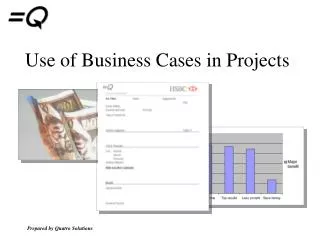
Use of Business Cases in Projects. Presentation Contents. Who am I? What is a Business Case? When do we ‘do’ a Business Case? Objectives & Benefits Estimating Costs Canning Projects Early Phasing Projects Measuring the Benefits Summary & Questions. Who Am I?.
309 views • 18 slides
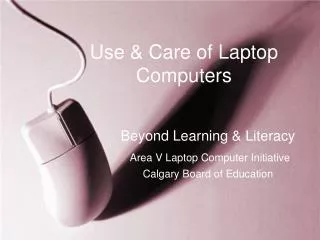
Use & Care of Laptop Computers. Beyond Learning & Literacy Area V Laptop Computer Initiative Calgary Board of Education. Taking Care of the Laptop. Never leave the laptop unattended Do not leave them in unsupervised areas – cafeteria, library, locker rooms, school grounds, hallways, etc
215 views • 5 slides

MI021 / CS021 Computers in Management. Oct. 13, 2006 Personalization & Mass Customization and - The Evolving Software Market. Topics Covered. Mass-Customization & Personalization Examples: Apparel, Food, Vehicle Advantage Motivating factors. Competitive advantage? Challenges & Pitfalls
259 views • 14 slides
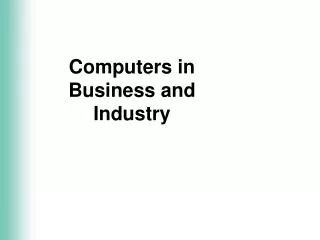
Computers in Business and Industry. Introduction. Computer technology has changed every aspect of business and industry In the factory In retail sales and marketing In banking In the office Computers have also impacted the health and quality of life of individuals
2.4k views • 35 slides
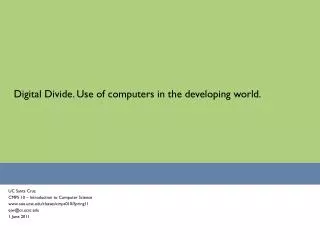
Digital Divide. Use of computers in the developing world. UC Santa Cruz CMPS 10 – Introduction to Computer Science www.soe.ucsc.edu/classes/cmps010/Spring11 ejw@cs.ucsc.edu 1 June 2011. Final Exam. Tuesday, June 7, 9am Note that registrar’s exam start time is 8am
220 views • 13 slides
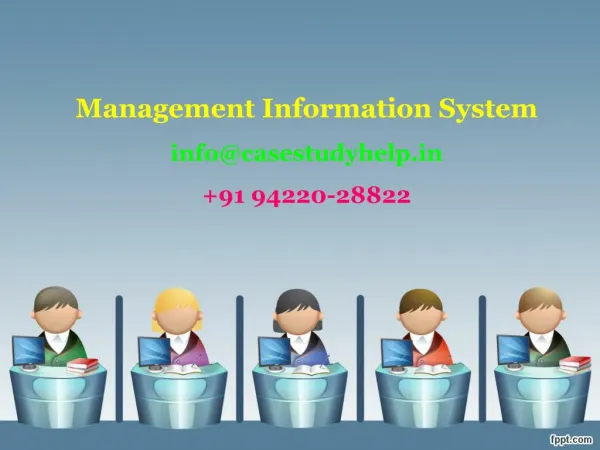
For Assignment Solution Contact Casestudyhelp.in https://www.casestudyhelp.in 9422028822 Management Information System 1. Explain various methods of decision making in any large scale industry with example. 2. Define MIS. Discuss application of MIS in Indian industries. 3. Explain identification and development of INFORMATION SOURCES 4. Explain the application of MIS in FINANCIAL and PRODUCTION management. 5. Explain artificial intelligence and expert system with suitable example. 6. Discuss the relationship between MIS and RDBMS with example. 7. Write note: Implementation and evaluation of MIS. 8. What is DSS? Explain DSS with suitable example. 9. Write note: Knowledgebase management system. 10. Discuss the use of computers in application of MIS. For Assignment Solution Contact Casestudyhelp.in https://www.casestudyhelp.in 9422028822
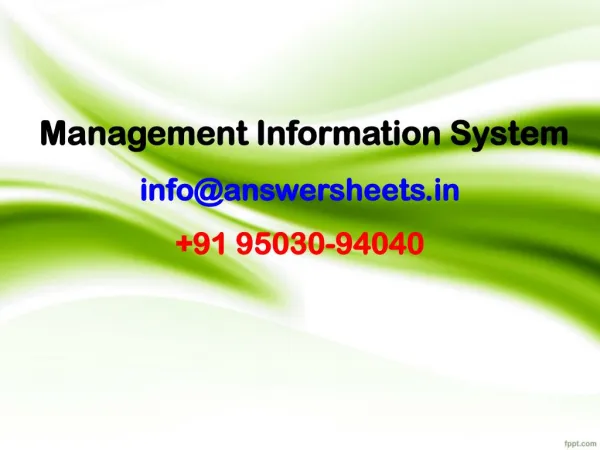
Need Answer Sheet of this Question paper Contact us at answersheethelp@gmail.com M: 7019944355
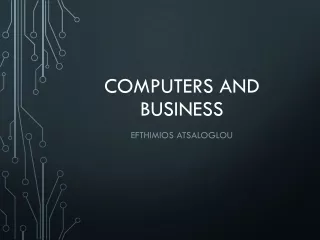
Computers and business. Efthimios atsaloglou. HISTORY I. 1801: Joseph Marie invents loom 1822: Charles Babbage conceives steam-driven calculating machine 1890: Herman Hollerith designs punch card system 1936: Alan Turing presents universal machine (Turing machine)
128 views • 10 slides

Introduction to the Use of Computers. Andrei Gurtov. Course Outline. Internet Unix Word processing HTML Spreadsheets Presentations Graphics Peripherals TeX. The Course. Registration: http://ilmo.cs.helsinki.fi/english.html Lectures 15.1-5.3 Tuesdays 12-14 A320 Practice sessions
454 views • 43 slides

Safe Use of Computers. Safety Training Pack. This page is intentionally blank. Introduction. This training pack is for use by all staff who use computers at work. You need to keep this training pack as it has health and safety information you need for your job.
440 views • 39 slides